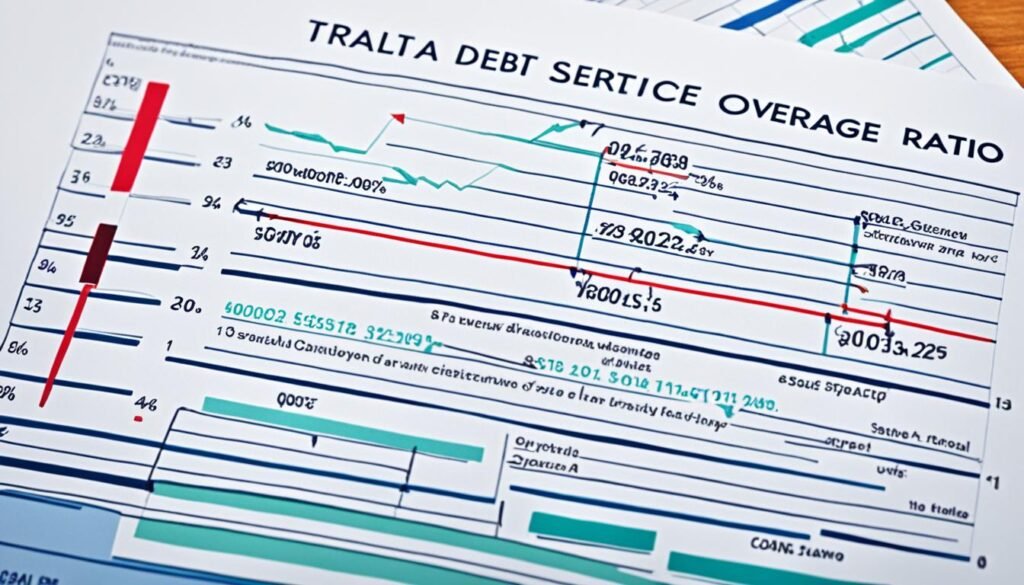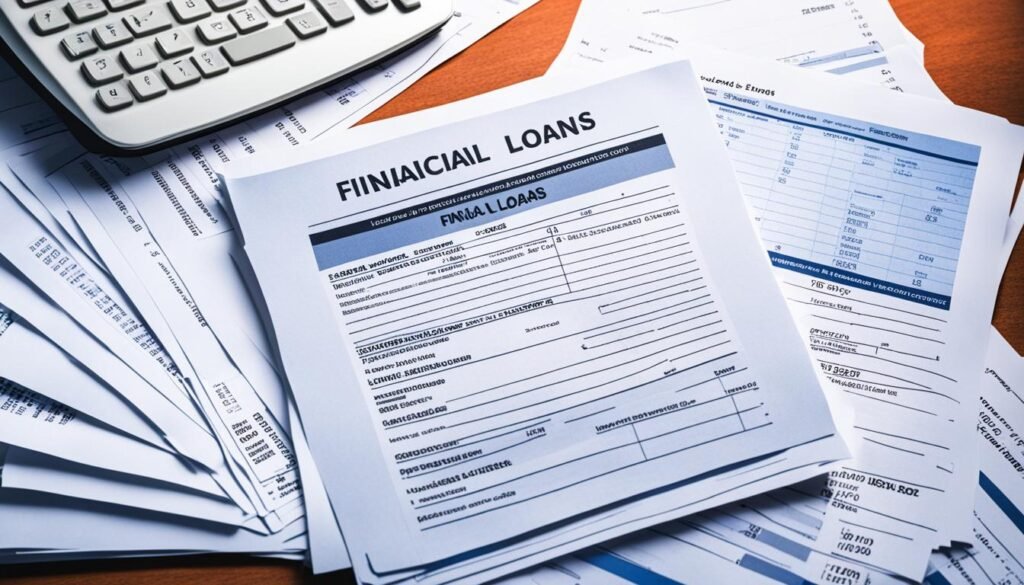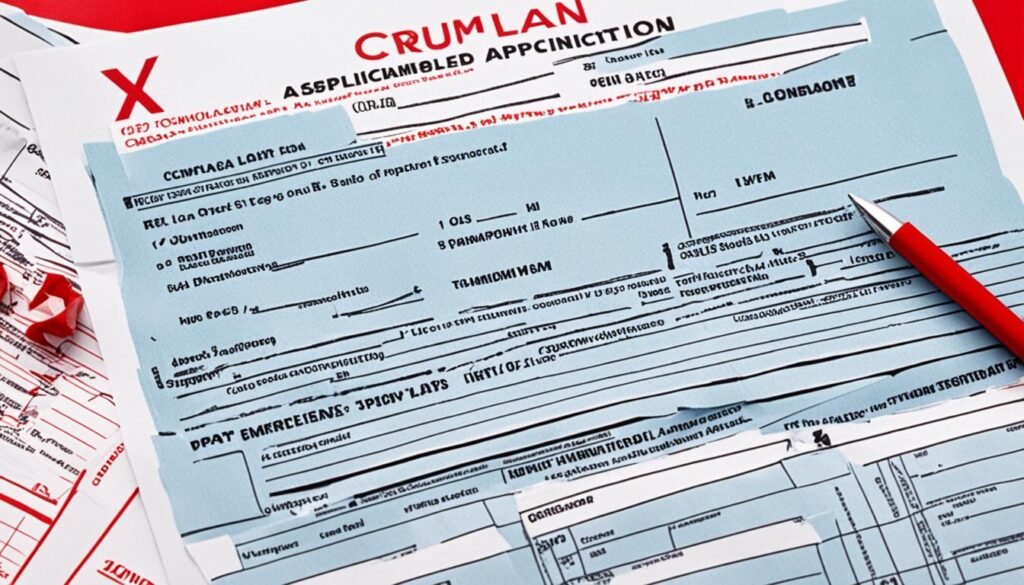To understand and navigate the process of applying for a small-business loan, it’s crucial to be aware of the key business loan requirements. Lenders typically evaluate several factors to determine loan eligibility. These include the amount needed, personal and business credit scores, annual revenue, years in business, and the industry and size of the business. Additionally, lenders may require a business plan and loan proposal, as well as collateral or a personal guarantee. Gathering the necessary business and financial documentation is essential for a successful loan application.
Key Takeaways:
- Understanding the business loan requirements is essential for a successful loan application.
- Lenders consider factors such as credit scores, annual revenue, years in business, and industry type to assess loan eligibility.
- Preparing a business plan and loan proposal, as well as gathering the necessary documentation, is crucial for a successful application.
- Personal and business credit scores play a significant role in loan eligibility and terms.
- Researching different loan options and comparing them is important to find the best fit for your business.
Personal and Business Credit Scores
When applying for a business loan, lenders often consider both personal and business credit scores to assess the risk associated with lending to a business. Personal credit scores, such as FICO scores, provide insight into an individual’s creditworthiness, while business credit scores offer a glimpse into a company’s financial responsibility.
To qualify for a government-backed Small Business Administration (SBA) loan or a traditional bank small-business loan, it’s typically necessary to have good personal credit. This usually means having a credit score of 690 or higher. Similarly, having excellent business credit is essential for loan eligibility and favorable terms.
Online lenders may be more lenient with credit scores, prioritizing factors like cash flow and track record over personal credit. However, businesses with good personal credit and excellent business credit have a higher likelihood of securing loans with competitive rates and terms.
Building and maintaining good credit, both personally and for your business, is crucial for loan eligibility and obtaining the best loan terms. This includes paying bills on time, keeping credit utilization low, and monitoring your credit regularly.
Understanding Credit Score Bands
Credit score bands categorize credit scores into different ranges, indicating the level of risk associated with lending to an individual or business. While exact credit score bands may vary among lenders, they generally follow a similar pattern:
| Credit Score Range | Risk Level |
|---|---|
| Excellent (800-850) | Low risk |
| Very Good (740-799) | Low risk |
| Good (670-739) | Medium risk |
| Fair (580-669) | High risk |
| Poor (300-579) | Very high risk |
Keep in mind that credit score bands are just one element lenders consider when evaluating loan applications. Though excellent credit scores offer more favorable loan terms, businesses with good personal credit still have a higher chance of acquiring funding compared to those with fair or poor credit.
Building Business Credit
Establishing and actively building business credit is essential for long-term financial success. Here are some strategies for building and maintaining excellent business credit:
- Open a business credit card and use it responsibly for business expenses.
- Make timely payments on all business credit accounts, including loans and vendor agreements.
- Monitor your business credit report regularly to detect errors or potential fraudulent activities.
- Establish trade lines by working with suppliers who report payments to business credit bureaus.
- Keep business and personal finances separate by establishing a distinct legal entity for your business.
By actively building business credit, you improve your chances of securing favorable loan terms and accessing larger amounts of funding when needed.
“A good credit score is a business’s best friend. It opens doors to financing opportunities and can save you thousands in interest fees.” – Financial Advisor
Understanding the importance of personal and business credit scores is essential when applying for a business loan. By focusing on building and maintaining good credit, both personally and for your business, you increase the likelihood of loan approval and secure the financing needed to fuel your business’s growth.
Annual Revenue and Debt Service Coverage Ratio

When it comes to applying for a business loan, lenders carefully consider the annual revenue and debt service coverage ratio of a company. These factors provide insight into a business’s cash flow and its ability to manage debt obligations.
Firstly, annual revenue is a key indicator of a business’s financial health. Lenders review the annual revenue to ensure that the company generates enough income to cover its loan payments. The minimum revenue requirements may vary among lenders, so it’s important to understand the specific criteria of each lender.
Secondly, the debt service coverage ratio (DSCR) is another metric that lenders evaluate. The DSCR compares the available operating income of a business to its current debt obligations. Lenders typically look for a DSCR ratio higher than 1, indicating that the company’s cash flow is sufficient to cover its debt payments.
By considering both annual revenue and the DSCR, lenders gain a holistic view of a business’s financial stability and its ability to meet its debt obligations. This assessment helps lenders determine the level of risk associated with providing a loan and can influence the terms and conditions offered.
To better understand the concept, let’s illustrate it with an example:
Suppose a company has an annual revenue of $500,000 and a debt service coverage ratio of 1.5. This means that the company generates enough cash flow to cover its debt obligations 1.5 times over. Lenders would view this as a positive indicator of the business’s ability to manage its debts.
This table provides a summary of how lenders evaluate a business’s annual revenue and debt service coverage ratio:
| Factors | Evaluation |
|---|---|
| Annual Revenue | Lenders consider the company’s annual revenue to ensure it generates enough cash flow to cover loan payments. |
| Debt Service Coverage Ratio (DSCR) | Lenders assess the DSCR to determine if the business has enough operating income to meet its current debt obligations. |
| Desirable Ratio | Lenders typically look for a DSCR ratio higher than 1, indicating that the business’s cash flow is sufficient to cover its debt payments. |
By understanding the importance of annual revenue and the debt service coverage ratio, businesses can prepare their financials and ensure they meet the necessary criteria for a loan application. Additionally, improving both the annual revenue and DSCR can enhance a company’s loan eligibility and potentially secure more favorable loan terms.
Years in Business and Industry Type
When applying for a business loan, lenders consider the number of years a business has been operating as a factor to assess its stability and ability to repay debts. Traditional banks typically require a minimum of two years in business as a prerequisite for loan eligibility. However, online lenders may have less stringent requirements, often accepting businesses that have been operating for as little as six months.
In addition to the number of years in business, lenders also consider the industry type of the business. Certain industries are perceived as high-risk and may face challenges in securing loans. These industries may include businesses involved in gambling, adult entertainment, cryptocurrency, and other industries with higher risk levels. Lenders may also have restrictions on lending to ineligible industries.
The Small Business Administration (SBA) provides loans specifically catered to small businesses, but they have their own size and industry criteria. The SBA aims to support businesses operating in industries that contribute to economic growth and job creation. Understanding the specific loan requirements for different industries and the eligibility criteria set by the SBA can help business owners make informed decisions when seeking financing.
Business Plan and Loan Proposal

A well-prepared business plan and loan proposal are essential components of a successful loan application. These documents provide lenders with crucial information about your business’s purpose for seeking the loan, its goals, and its ability to generate the necessary cash flow to repay the loan.
Your business plan outlines your company’s mission, objectives, and strategies for achieving growth and profitability. It should also detail how the loan funds will be utilized to support your business’s expansion or operational needs. Lenders want to see a clear and realistic plan that demonstrates a strong potential for success.
“A well-prepared business plan and loan proposal are essential components of a successful loan application.”
In addition to your business plan, a comprehensive loan proposal is necessary to provide detailed financial projections, showcasing the viability of your business and its ability to generate the necessary cash flow to cover loan payments. This proposal should highlight your business’s historical financial performance, as well as projected balances, income statements, and cash flow statements. It should also clearly state your business’s goals and how the loan will help you achieve them.
A strong business plan and loan proposal not only show lenders that you have a clear roadmap for success, but they also provide reassurance that the loan will be used judiciously and repaid in a timely manner. These documents serve as a concrete representation of your business’s professionalism and dedication to financial responsibility.
Don’t underestimate the importance of a well-crafted business plan and loan proposal. These documents are crucial in convincing lenders to approve your loan application and provide the funding you need to achieve your business goals.
Collateral or Personal Guarantee

When applying for a business loan, you may come across the terms “collateral” and “personal guarantee.” These are important aspects to consider as they can significantly impact the terms and requirements of your loan.
Secured loans often require collateral, which serves as a form of security for the lender. Collateral can take various forms, such as equipment, real estate, or inventory. In the event that you are unable to make loan payments, the lender can seize the collateral to recoup their losses.
On the other hand, personal guarantees are another method lenders use to minimize risk. With a personal guarantee, the business owner becomes personally liable for loan repayment if the business fails to make payments. This means that your personal assets may be at risk if the business is unable to fulfill its financial obligations.
It’s important to note that not all loans require collateral or personal guarantees. Unsecured loans, for example, do not necessitate collateral but may still require a personal guarantee. These loans generally carry higher interest rates to compensate for the increased risk on the lender’s part.
In some cases, lenders may also have the right to take possession of specific business assets in the event of default. This further emphasizes the importance of understanding the loan terms and the potential consequences for non-payment.
Before committing to a loan, it’s crucial to carefully assess the potential risks and benefits associated with collateral and personal guarantees. Consider the value of your business assets and your personal financial situation before making a decision. Consulting with a financial advisor or loan specialist can provide you with valuable insights and help you navigate these complexities with confidence.
Business and Financial Documentation

When applying for a small-business loan, lenders typically request a wide range of documentation. These documents are essential for lenders to evaluate the financial health and viability of your business. It is crucial to prepare accurate and up-to-date documentation to increase your chances of a successful loan application.
Gathering the Necessary Documents
Here are the key documents that lenders commonly require:
- Bank Statements: Provide your personal and business bank statements to demonstrate your cash flow and financial stability.
- Tax Returns: Submit both personal and business tax returns to verify your income and ensure compliance with tax obligations.
- Balance Sheets: Include your business’s balance sheets to reveal its financial position, including assets, liabilities, and equity.
- Commercial Leases: If applicable, provide copies of your commercial leases to showcase your business’s physical location and operating arrangements.
- Business Licenses: Present your business licenses to validate your legal authority to operate in your industry.
- Articles of Incorporation: If your business is incorporated, include the articles of incorporation to prove its legal structure.
In addition to these documents, lenders may also require a business plan with financial projections. A well-prepared business plan demonstrates your understanding of your industry, market, and finances. It outlines your goals, strategies, and the purpose of the loan, giving lenders confidence in your ability to repay.
Providing comprehensive and organized documentation is crucial for a successful loan application. Make sure to gather and prepare all the necessary documents, ensuring they are accurate, up-to-date, and easily accessible for submission. By doing so, you will increase your chances of securing the financing your business needs to thrive.
Finding the Right Business Loan

When searching for the best business loan, there are several factors to consider to ensure that you find the most suitable financing option for your small business. It’s important to evaluate loan rates, loan terms, and your business qualifications to make an informed decision. Taking the time to compare different loan options and conducting thorough research can greatly increase your chances of securing the ideal financing for your business.
Interest Rates: One crucial factor to consider is the interest rate associated with the loan. A lower interest rate can save your business a significant amount of money over time. It’s important to compare interest rates offered by different lenders to find the most competitive rates available.
Loan Terms: Another vital consideration is the loan terms. This includes the duration of the loan, repayment frequency, and any additional fees or penalties. Understanding the loan terms is essential to ensure that they align with your business’s financial goals and capacity to make timely repayments.
Business Qualifications: Lenders often have specific qualifications that businesses must meet to be eligible for a loan. These qualifications may include minimum revenue requirements, years in business, and credit scores. Understanding your business’s qualifications and finding lenders whose criteria align with your business’s profile can streamline the loan application process and increase your chances of approval.
Aside from these key factors, there are other considerations that can help guide your decision-making:
- Time to Fund: Different lenders have different processing times, and understanding how long it takes for funds to be disbursed can be crucial, especially if you have urgent financing needs.
- Qualification Criteria: Some lenders may have stricter qualification criteria than others. It’s important to evaluate your business’s eligibility for a loan before applying to avoid unnecessary rejections.
- Lender Reputation: Researching and considering the reputation of lenders can provide insights into their reliability, customer service, and overall experience. Evaluating a lender’s reputation can help you make an informed decision.
By conducting comprehensive research and comparing small-business loans, you can identify the best financing option that meets your business’s specific needs. Remember to focus not only on getting the most favorable loan rates and terms but also on choosing a reputable lender that truly understands and supports your business goals.
| Loan Provider | Interest Rates | Loan Terms | Business Qualifications | Overall Rating |
|---|---|---|---|---|
| Bank A | 4.5% – 6.5% | 1-5 years | Minimum 2 years in business, good credit score, $100,000 annual revenue | ★★★★★ |
| Online Lender B | 7.2% – 10.5% | 6 months – 3 years | No minimum years in business, minimum credit score of 600, $50,000 annual revenue | ★★★☆☆ |
| Credit Union C | 5.8% – 8.2% | 3-10 years | Minimum 1 year in business, excellent credit score, $250,000 annual revenue | ★★★★☆ |
Business Loan Comparisons
The table above showcases a comparison of different loan providers based on their interest rates, loan terms, and business qualifications. While Bank A offers lower interest rates and longer loan terms, it requires a minimum of two years in business. Online Lender B, on the other hand, has higher interest rates but more lenient qualifications, making it accessible to businesses with less operating history. Credit Union C offers competitive rates and a moderate loan term but requires excellent credit scores and higher annual revenue requirements. Evaluating these options and considering your business’s specific needs can help you find the best business loan.
Common Business Loan Application Mistakes

Avoiding common mistakes can significantly increase your chances of loan approval. By understanding the potential pitfalls and taking the necessary precautions, you can navigate the loan application process with confidence.
Last-Minute Applications
One common mistake is waiting until the last minute to apply for a business loan. Rushing through the application process can lead to overlooked details and errors in the documentation. It’s important to give yourself enough time to gather all the necessary information and submit a complete application.
Incorrect Form Completion
Inaccurate or incomplete form completion is another common error that can result in loan rejections. Be sure to carefully review all the application forms and provide accurate information. Pay close attention to details such as spelling, numbers, and dates to avoid any discrepancies that could raise concerns with lenders.
Lack of Clear Plan
When applying for a business loan, it’s essential to have a clear plan for how you will use the loan funds. Lenders want to see that you have a solid strategy for utilizing the funds to grow your business and generate a positive return on investment. Take the time to develop a detailed business plan that outlines your goals and how the loan will support them.
Making Changes Before Applying
Making significant changes to your business just before applying for a loan can raise red flags for lenders. They prefer to see stability and consistency in the business’s operations and financials. Avoid making major changes, such as rebranding, restructuring, or relocating, shortly before submitting your loan application.
“Taking the time to prepare and understand the loan application process can help prevent these mistakes.”
By being proactive and avoiding these common mistakes, you can increase your chances of loan approval and secure the financing your business needs to thrive.
Next Section: Different Types of Business Loans
Different Types of Business Loans

When it comes to meeting your business’s financing needs, there are various types of loans available. Understanding the purpose and specific qualifications for each can help you make an informed decision. Here are some common types of business loans:
1. Term Loans
A term loan is a lump sum loan that is repaid over a fixed period, typically with regular monthly payments. It can be used to finance specific business expenses, such as equipment purchases or expansion projects. Term loans often have competitive interest rates and flexible repayment options.
2. SBA Loans
SBA loans are government-backed loans that are designed to support small businesses. These loans are provided by lenders approved by the Small Business Administration (SBA) and offer favorable interest rates and longer repayment terms. SBA loans can be used for various purposes, such as working capital, equipment purchases, and real estate.
3. Business Lines of Credit
A business line of credit provides you with a revolving credit limit that you can use as needed. It is similar to a credit card, but with higher credit limits and lower interest rates. With a business line of credit, you have the flexibility to access funds whenever necessary and only pay interest on the amount used.
4. Invoice Factoring
Invoice factoring involves selling your accounts receivable to a factoring company at a discount. This allows you to access immediate cash flow by receiving an advance on the value of your outstanding invoices. The factoring company then collects payment from your customers.
Factoring can help businesses with cash flow challenges or those that have a lot of outstanding invoices. It’s important to carefully consider the terms and fees associated with invoice factoring before choosing this option.
5. Working Capital Loans
A working capital loan provides funds to cover your business’s day-to-day operational expenses, such as payroll, inventory, and rent. It is designed to bridge short-term cash flow gaps and ensure the smooth operation of your business.
6. Equipment Financing
If your business needs to purchase or upgrade equipment, equipment financing can provide the necessary funds. This type of loan is secured by the equipment itself and offers flexible payment options tailored to your business’s cash flow.
Choosing the right type of business loan depends on your specific needs and financial situation. Assess your goals, repayment abilities, and eligibility criteria to find the loan that best fits your business’s requirements.
Next Steps in the Loan Process

Once you have a clear understanding of the business loan requirements and the types of loans available, it’s time to move forward with the loan process. This section outlines the next steps you should take to secure financing for your business.
- Lender Research: Begin by researching lenders that offer loans suitable for your business needs. Consider factors such as interest rates, loan terms, and the lender’s reputation. It’s essential to find a lender that aligns with your loan qualifications and offers favorable terms.
- Documents Preparation: Gather all the necessary documents required for the loan application process. This may include business and personal financial statements, tax returns, bank statements, business licenses, and any other documentation specific to your business and the loan you are pursuing. Ensure that all documents are accurate, complete, and up-to-date.
- Loan Application: Complete the loan application forms provided by the lender. Double-check all the information you provide to ensure accuracy. Pay attention to the details and follow the instructions carefully. Any errors or omissions in your application can potentially delay the approval process.
- Loan Approval: Once you have submitted your loan application, you will need to wait for the lender to review and process your request. The approval process can vary in duration, depending on the lender and the complexity of your loan application. Stay in touch with the lender and promptly provide any additional information or documentation they may require.
- Decision Making Process: Once you receive loan offers from different lenders, it’s time to make an informed decision. Carefully evaluate the terms and conditions of each offer, including interest rates, loan amounts, repayment terms, and any other relevant factors. Consider your business’s financial situation and goals to determine which loan offer is the best fit for your needs.
Remember, the loan process requires patience, thoroughness, and decision-making skills. By conducting thorough lender research, preparing the necessary documents, completing the loan application accurately, and carefully considering loan offers, you can navigate the loan process successfully and secure the financing your business requires.
Next Steps: Decide What Type of Business Loan You Need
Once you’ve determined the amount you require, it’s crucial to select the right type of business loan. Consider factors such as repayment terms, interest rates, and eligibility criteria. If you need funds for a specific purpose like purchasing equipment, a term loan might be ideal. For short-term needs like managing cash flow, a line of credit could be more suitable. Alternatively, if you’re starting a new venture, a startup loan may be available. Research the options thoroughly, compare offers from different lenders, and choose the one that aligns best with your business goals and financial situation.
Six requirements to get a business loan
To secure a business loan, six key requirements must typically be met. Firstly, a solid credit history and score are essential for demonstrating financial responsibility. Secondly, lenders often require a detailed business plan outlining objectives, strategies, and financial projections. Thirdly, proof of sufficient revenue and cash flow is necessary to ensure repayment capability. Additionally, collateral may be needed to secure the loan. Furthermore, lenders usually assess the borrower’s debt-to-income ratio to gauge financial stability. Lastly, meeting any industry-specific criteria or legal requirements may also be necessary for loan approval. Fulfilling these requirements increases the likelihood of securing a business loan.
3. Compare small business lenders
When comparing small business lenders, consider several factors. Start by assessing interest rates, as they directly impact the cost of borrowing. Next, evaluate the loan terms, including repayment periods and any fees involved. Additionally, examine the lender’s reputation and customer service quality through reviews and testimonials. It’s also crucial to consider the lender’s flexibility in accommodating your specific business needs. Lastly, compare eligibility criteria to ensure you meet the requirements. By thoroughly evaluating these aspects across different lenders, you can make an informed decision that aligns with your business goals and financial situation.
Also Read: Securing Financing: How To Get A Loan To Buy A Business
Conclusion
Understanding business loan requirements and navigating the loan application process is essential to secure financing successfully. By being aware of the key factors lenders consider, preparing the necessary documentation, and having a clear plan for the loan funds, business owners can increase their chances of approval and secure the financing they need to grow and thrive.
Meeting the business loan requirements set by lenders is the first step towards a successful loan application. This includes having a solid credit score, stable revenue, and appropriate years in business. Gathering and organizing the required financial documents such as tax returns, bank statements, and balance sheets is crucial for a smooth loan application process.
Moreover, preparing a comprehensive business plan and loan proposal that clearly outlines the purpose of the loan, projected cash flow, and business goals can significantly enhance the loan approval chances. It is equally important to explore different types of business loans available in the market and find the one that suits your business needs and qualifications.
Securing financing through a successful loan application can provide the necessary capital to fuel business growth, expand operations, invest in equipment, or meet any other financial requirements. By understanding the loan requirements, following the loan application process diligently, and effectively presenting your business’s financial stability and potential, you can maximize the likelihood of loan approval and secure the funding necessary to achieve your business aspirations.
FAQs
Q: What are the basic requirements for a small business loan?
A: Basic requirements for a small business loan typically include a strong credit score, business plan, financial statements, and collateral.
Q: How can I qualify for a business loan?
A: To qualify for a business loan, you may need to show a good credit history, stable business income, and collateral to secure the loan.
Q: What is the importance of time in business when applying for a small business loan?
A: Lenders often look for established businesses with a track record of success, so the longer your business has been operating, the better your chances of approval.
Q: How can I increase my chances of getting approved for a small business loan?
A: You can improve your chances of approval by preparing a solid business plan, maintaining a good credit score, and having all necessary documents ready for the application.
Q: What are some common small business loan requirements I need to be aware of?
A: Common requirements include a minimum credit score, time in business, business financial statements, and the purpose of the loan.
Q: Do I need to provide collateral for a small business loan?
A: Depending on the type of loan, lenders may require collateral to secure the loan, such as personal or business assets.
Q: How can I apply for a small business loan if I am a new small business owner?
A: As a new business owner, you may still be eligible for a small business loan by demonstrating a strong business plan, personal credit history, and potential for success.




